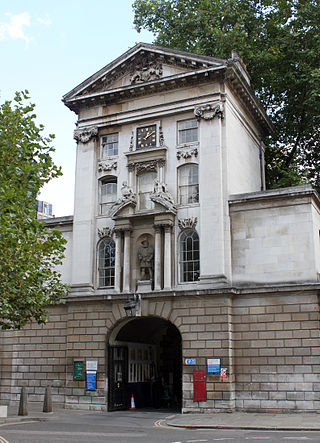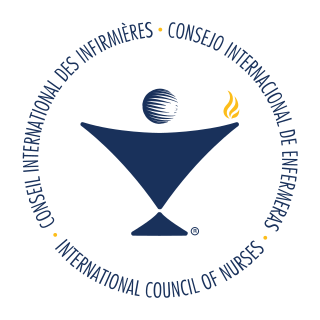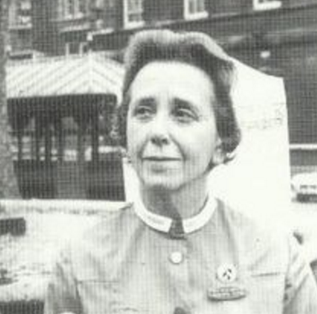Related Research Articles

Princess Helena, later Princess Christian of Schleswig-Holstein, was the third daughter and fifth child of Queen Victoria and Prince Albert.

The Royal College of Nursing (RCN) is a registered trade union in the United Kingdom for those in the profession of nursing. It was founded in 1916, receiving its royal charter in 1928. Queen Elizabeth II was the patron until her death in 2022. The majority of members are registered nurses; however student nurses and healthcare assistants are also members. There is also a category of membership, at a reduced cost, for retired people.

St Bartholomew's Hospital, commonly known as Barts, is a teaching hospital located in the City of London. It was founded in 1123 and is currently run by Barts Health NHS Trust.

The International Council of Nurses (ICN) is a federation of more than 130 national nurses associations. It was founded in 1899 and was the first international organization for health care professionals. It is headquartered in Geneva, Switzerland.

Ethel Gordon Fenwick was a British nurse who played a major role in the History of Nursing in the United Kingdom. She campaigned to procure a nationally recognised certificate for nursing, to safeguard the title "Nurse", and lobbied Parliament to pass a law to control nursing and limit it to "registered" nurses only.
The Hospital and Welfare Services Union (HWSU) was established in 1918 as the Poor Law Workers Trade Union. It recruited from all ranks in the poor law service. Within a year it claimed 10,000 members.

Dame Alicia Frances Jane Lloyd Still, DBE, RRC, SRN (1869–1944) was a British nurse, teacher, hospital matron and leader of her profession. She was one of the leaders in the campaign for state registration of nurses. Following the Nurses Registration Act 1919, she was a member of the General Nursing Council (1920-1937). As chairwoman of the General Nursing Council's first Education and Examinations Committee she helped establish the first national examination standards for the registration of nurses.
The history of nursing in the United Kingdom relates to the development of the profession since the 1850s. The history of nursing itself dates back to ancient history, when the sick were cared for in temples and places of worship. In the early Christian era, nursing in the United Kingdom was undertaken by certain women in the Christian Church, their services being extended to patients in their homes. These women had no real training by today's standards, but experience taught them valuable skills, especially in the use of herbs and folk drugs, and some gained fame as the physicians of their era. Remnants of the religious nature of nurses remains in Britain today, especially with the retention of the job title "Sister" for a senior female nurse.
The British Journal of Nursing is a medical journal covering nursing. In addition to academic material on nursing and hospitals, the journal provides information on people and events as well as photographs and advertisements. There have been two versions of the journal, one historic and one modern.

Margaret Rachel Huxley (1854–1940) was an English nurse who introduced structured, scientific nursing training in Ireland. Her initiatives led to the establishment of the first nursing school in Dublin. She was involved in numerous organisations promoting professionalism in nursing and campaigning for nurse registration throughout the British Isles.
The Fever Nurses Association was established in London in 1908.

Winifred Emily Hector FRCN was an English nurse and textbook author. She played a significant part in introducing modern curriculum and teaching methods to British nursing education.
The General Nursing Council for England and Wales was established by the Nurses Registration Act 1919 to administer the register of nurses. It was responsible for deciding the rules for admission to the register.
Voluntary hospitals were created from the eighteenth century in England. In America, Ireland, and Australia, voluntary hospitals were established later. They can be distinguished from municipal hospitals, which were publicly owned, and private hospitals, which were run commercially. They were initially financed by public subscription. A voluntary hospital may also be a charitable hospital.
The Workhouse Infirmary Nursing Association was created in 1879 to organise training and act as an employment agency for nurses in Poor law infirmaries and workhouses.

The Nurses Registration Act 1919 was an Act of Parliament of the United Kingdom.
The Matrons' Council for Great Britain and Ireland was established in 1894 during the campaign for the registration of nurses and was disbanded c.1955.
Workhouse infirmaries were established in the nineteenth century in England. They developed from the Workhouse and were run under the Poor law regime.
Rachel FrancesLumsden was a British nurse, and hospital manager.

Frances Goodall CBE was a British nurse who was General Secretary of the Royal College of Nursing and a founder of what became the Colostomy Association.
References
- ↑ "The Origins of The Royal British Nurses' Association". Royal British Nurses Association. Retrieved 6 June 2017.
- ↑ Seweryn Chomet, Helena: A Princess Reclaimed (Begell House, New York, 1999) p. 120
- ↑ "The nursing record and hospital world". 17 July 1897.
- ↑ Abel-Smith, Brian (1960). A History of the Nursing Profession. London: Heinemann. p. 59.
- ↑ Abel-Smith, Brian (1960). A History of the Nursing Profession. London: Heinemann. p. 81.
- ↑ "Registration of Nurses". Royal British Nurses' Association. 2008. Archived from the original on 9 February 2008. Retrieved 21 February 2008.
- ↑ Abel-Smith, Brian (1960). A History of the Nursing Profession. London: Heinemann. p. 101.